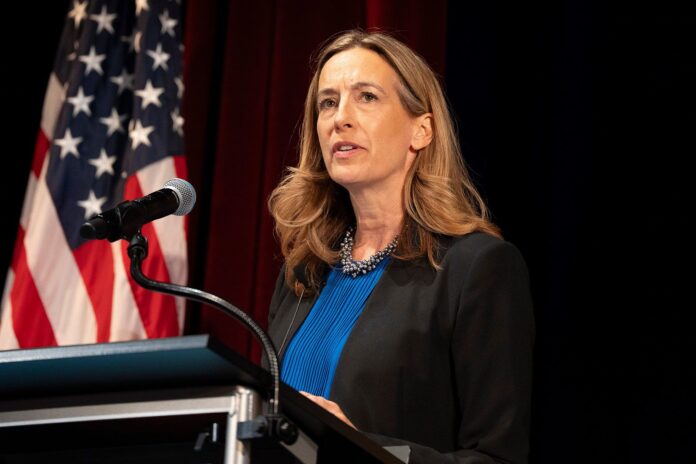New Jersey politics is entering a volatile stage as the race for governor between Democratic candidate Mikie Sherrill and Republican challenger Jack Ciattarelli takes a sharper, more personal turn. With just weeks until voters head to the polls, the campaigns are trading blows over leaked military records, health care costs for state employees, and the future of environmental protections, creating a high-stakes contest that has drawn national attention.

A recent Emerson College poll reveals just how competitive the race has become, showing Sherrill and Ciattarelli locked in a statistical tie at 43 percent each. The dead heat sets the stage for one of the most contentious gubernatorial showdowns New Jersey has seen in years, with both candidates seeking to rally their bases and win over undecided voters in the final stretch.
The temperature of the race spiked last week after the release of private military records tied to Sherrill’s time at the U.S. Naval Academy. The records were obtained through a Freedom of Information Act request submitted by Nicholas De Gregorio, a Republican political figure and ally of Ciattarelli. According to federal officials, the documents were improperly released in full, including Sherrill’s Social Security number, after an employee at the National Personnel Records Center bypassed standard review procedures.
Sherrill’s campaign has described the release as an unlawful invasion of privacy and accused Ciattarelli’s allies of weaponizing her service history for political gain. Ciattarelli has denied those claims, arguing that the release was the result of a clerical error and pressing Sherrill to disclose her full disciplinary record from the Naval Academy. The controversy has reignited a decades-old episode from 1994, when Sherrill faced restrictions at graduation for refusing to identify classmates involved in an alleged cheating scandal. While she maintains she was never accused of academic dishonesty, Ciattarelli’s campaign has attempted to cast doubt on her record.
The fallout has sparked outrage across the state, with veterans’ groups weighing in on the matter. The Somerset County Democratic Veterans Caucus issued a strong statement defending Sherrill’s nearly decade-long service, including her years as a Navy helicopter pilot and her documented role in saving the life of a fellow midshipman. Members of the caucus argued that her refusal to implicate classmates reflected integrity rather than misconduct and condemned the use of military records in partisan attacks.
National leaders have also called for a federal investigation into the improper release. House Minority Leader Hakeem Jeffries joined members of New Jersey’s congressional delegation in urging the Department of Justice to review whether laws were violated. The National Archives, which oversees the personnel center, has issued a formal apology to Sherrill and requested that the documents not be further circulated.
Even as the campaigns spar over character and personal history, other policy matters are reshaping the political debate. On Wednesday, a state benefits panel approved changes to the State Health Benefits Program aimed at reducing state spending by $150 million. The decision will mean higher copays, deductibles, and out-of-pocket maximums for active state employees, though retirees will not see changes to their coverage. The move has already drawn criticism from unions and public sector workers who argue that rising health care costs will place an additional burden on middle-class families. Both Sherrill and Ciattarelli are under pressure to clarify how they would address the long-term sustainability of health benefits without forcing deeper cuts or tax increases.
Meanwhile, Governor Phil Murphy and Acting Governor Tahesha Way have kept environmental issues at the forefront during Climate Week, releasing the 2025 Green Jobs Report. The study highlights opportunities for New Jersey’s workforce as the state transitions toward renewable energy and a low-carbon economy. Alongside the report, Way signed legislation requiring landlords to notify tenants of potential lead contamination in drinking water and mandating free testing from public water providers upon request. The Murphy Administration also announced $13 million in new funding to combat harmful algal blooms, a persistent problem for lakes and rivers across the state.
Republicans, however, have pointed to early voting trends as a sign of optimism. Data shows that the GOP is running nearly ten points ahead of Democrats in vote-by-mail returns compared to previous election cycles. While the margin could narrow as more ballots are counted, the numbers underscore Ciattarelli’s strength with his base and the heightened enthusiasm among Republican voters this year.
The heated exchanges between Sherrill and Ciattarelli, paired with the deeply consequential policy debates unfolding in Trenton, are defining what many view as a pivotal election for New Jersey’s future. With the outcome still uncertain, the next several weeks will likely feature sharper contrasts, higher stakes, and a continued focus on issues that resonate with voters across the state.
To follow ongoing coverage of New Jersey’s gubernatorial race and other developments in state politics, Explore New Jersey’s Politics section provides in-depth reporting and analysis on the latest news shaping the Garden State.












